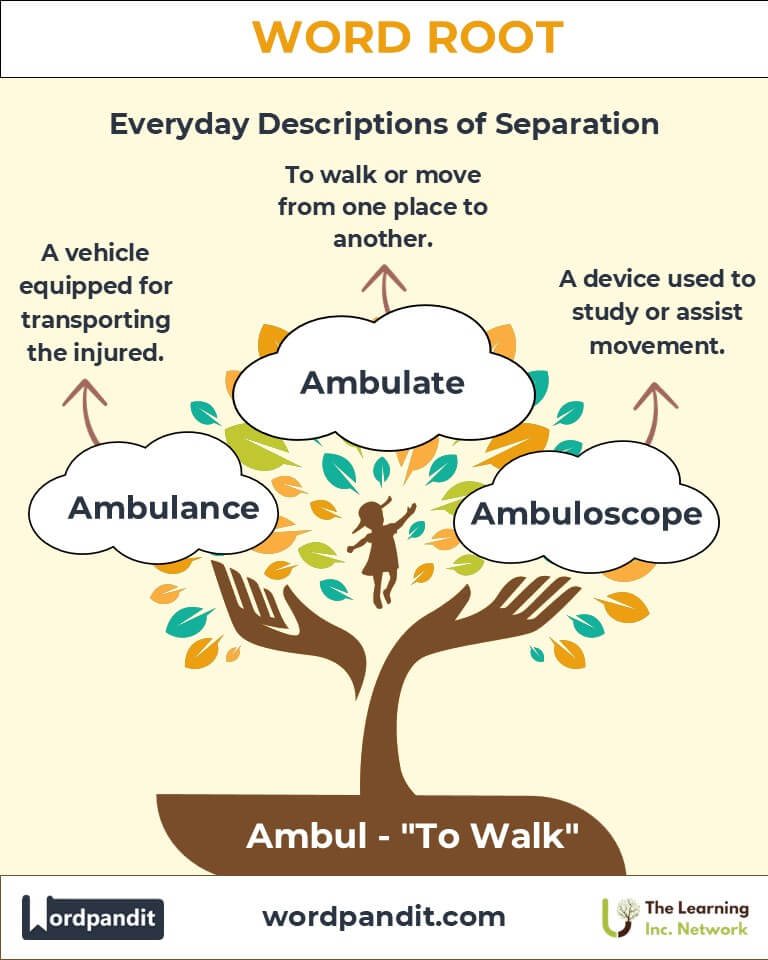Ambul: The Root of Movement and Travel in Language
Byline: Discover how the Latin root "Ambul," meaning "to walk" or "to move," has paved its way into English vocabulary. From "ambulance" to "amble," this root signifies motion and mobility, forming the backbone of many terms used in medicine, travel, and more.

Table of Contents
- Introduction: The Power of "Ambul"
- Etymology and Historical Journey
- Mnemonic: Unlocking the Power of "Ambul"
- Common "Ambul"-Related Terms
- "Ambul" Through Time
- "Ambul" in Specialized Fields
- Illustrative Story: "Ambul" in Action
- Cultural Significance of the "Ambul" Root
- The "Ambul" Family Tree
- FAQs about the "Ambul" Word Root
- Test Your Knowledge: "Ambul" Mastery Quiz
- Conclusion: The Living Legacy of "Ambul"
1. Introduction: The Power of "Ambul"
Have you ever wondered about the origins of the word "ambulance"? The term traces its roots to "Ambul," derived from the Latin word ambulare, meaning "to walk" or "to move about." Pronounced am-buhl, this root finds itself at the heart of words that denote motion, travel, and even healing. From leisurely ambles to critical medical responses, "Ambul" exemplifies the essence of mobility in language and life.

2. Etymology and Historical Journey
The root "Ambul" originates from the Latin ambulare, meaning "to walk." In ancient Rome, walking symbolized life’s movement—whether physical or metaphorical. Over time, "Ambul" became embedded in words related to travel, movement, and later, healing. For instance, the term "ambulance" evolved from the mobile medical units used to carry wounded soldiers on the battlefield.
During the Enlightenment and Industrial eras, "Ambul" terms expanded, reflecting advancements in medicine and transportation. Today, the root embodies both literal and metaphorical journeys.
3. Mnemonic: Unlocking the Power of "Ambul"
Imagine a small figure walking tirelessly on a path labeled "Ambul" as they explore new terrains, representing endless motion.
Mnemonic Device: "Ambul means to amble, move, and heal."
4. Common "Ambul"-Related Terms
- Amble (am-buhl): To walk slowly or leisurely.
Example: "They amble through the park every evening, enjoying the cool breeze." - Ambulance (am-byoo-luhns): A vehicle used to transport the sick or injured.
Example: "The ambulance arrived swiftly to rush the patient to the hospital." - Ambulatory (am-byuh-luh-tor-ee): Related to walking or capable of walking.
Example: "Post-surgery, the patient became ambulatory within three days." - Preamble (pree-am-buhl): An introduction, often metaphorically signifying the initial "walk" into a topic.
Example: "The preamble of the speech set the stage for an engaging discussion." - Ambulator (am-byoo-lay-ter): A device used to assist in walking, like a walker.
Example: "The elderly man relied on his ambulator to move around safely."
5. "Ambul" Through Time
- Medieval Era: "Ambulant" referred to traveling clerics or physicians.
Example: The term highlighted movement in service of faith or healing. - Modern Medicine: "Ambulatory care" emerged, emphasizing outpatient treatments.
Example: This reflects a shift from stationary hospitals to mobile medical services.
6. "Ambul" in Specialized Fields
- Medicine:
Ambulatory Surgery: Refers to outpatient surgeries where patients do not need overnight hospitalization.
Relevance: Revolutionized healthcare, making it more accessible and efficient. - Literature and Rhetoric:
Preamble: An introductory section setting the stage for a document or speech.
Significance: Reflects the metaphorical “first steps” of discourse. - Technology:
Ambulatory Devices: Tools aiding mobility, such as prosthetics or mobility aids.
Impact: Improved quality of life for individuals with movement impairments.
7. Illustrative Story: "Ambul" in Action
In a bustling city, Maria, an ambulatory nurse, rushed to assist an elderly man who had collapsed. As she calmly provided care, an ambulance arrived, a vivid symbol of modern mobility in healthcare. Later, Maria took an amble through the park, reflecting on her fulfilling day and the interconnectedness of motion, healing, and humanity.
8. Cultural Significance of the "Ambul" Root
"Ambul" carries profound cultural significance, symbolizing life’s journey. Whether in ancient Rome, where walking was a vital part of daily life, or today’s fast-paced world, the root ties mobility to freedom and progress. Phrases like “take a walk” resonate deeply, embodying both literal and figurative explorations.

9. The "Ambul" Family Tree
- Mob (Latin: "move"):
Mobile: Capable of moving.
Motivation: The force driving movement. - Ped (Latin: "foot"):
Pedestrian: A person walking along a road.
Pedometer: A device that counts steps. - Curr (Latin: "run"):
Current: Flowing or running.
Concurrent: Happening at the same time.
FAQs About the Ambul Word Root
Q: What does "Ambul" mean?
A: "Ambul" comes from the Latin word ambulare, meaning "to walk" or "to move." It forms the foundation for words related to motion, travel, and mobility, both literal and metaphorical.
Q: Why is "ambulance" related to walking?
A: "Ambulance" originates from the French phrase hôpital ambulant, meaning "walking hospital." Historically, it referred to mobile medical units that could reach and treat injured soldiers on the battlefield.
Q: What does "ambulatory" mean in medicine?
A: "Ambulatory" describes a patient who can walk and doesn’t require bedrest. It also refers to outpatient care, where patients are treated without needing overnight hospitalization.
Q: How is "preamble" linked to "Ambul"?
A: "Preamble" metaphorically represents the first steps of a speech, document, or action. Derived from the Latin praeambulus ("walking before"), it sets the stage for what follows.
Q: What’s the difference between "amble" and "stroll"?
A: Both "amble" and "stroll" refer to leisurely walking. However, "amble" often implies a carefree attitude or purpose, while "stroll" might emphasize enjoying the scenery more.
Test Your Knowledge: Ambul Mastery Quiz
1. What does "Ambul" mean?
2. What term describes outpatient medical care?
3. Which word means "to walk leisurely"?
4. How was the word "ambulance" historically used?
5. What is an ambulator?
12. Conclusion: The Living Legacy of "Ambul"
The root "Ambul" embodies the essence of movement and progress. From its origins in ancient Rome to its present-day applications in medicine and technology, this linguistic cornerstone reminds us of the vital role mobility plays in life. As we stride forward into the future, "Ambul" continues to inspire innovations and expressions of human movement and resilience.













Roots explained beautifully. Thank you